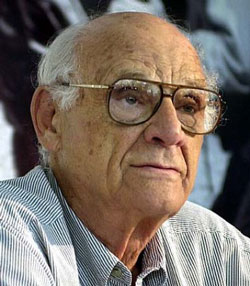The Crucible
Written by Arthur Miller
Directed by Geoffrey O'Keeffe
Performed in the
The Mill Theatre, Dundrum - Wednesday 26 to Saturday 29 March 2014
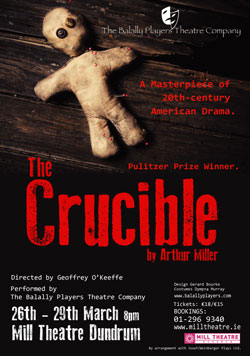
'The Crucible', written by Arthur Miller around the middle of the twentieth century is a big, classic play — a story rooted in a time long past, but with echoes that touch upon issues that have a perennial relevance.
The curtain closed on the final performance of 'The Crucible' on Saturday 29 March 2014. After the final piece of the set was dismantled, the props were removed, the lights and their cables were packed away and the stage was returned to a bare space once again, the team involved in putting it all together reflected on a very successful show — one that filled the theatre and thrilled audiences throughout its short run.
The play, which is based on the Salem Massachusetts witch trials of 1692, is a large ensemble piece in four acts. The story about 'witchery' and how a small community responded 300 years ago can seem remote and alien until its modern relevance is realised. Whether it is fighting an 'axis of evil' or just plain gluttonous greed, paranoia or power with an axe to grind, in parts of the world, some still swing for what they say as much as what they do. In that sense not much has changed since 1692 when they hanged what they called witches in the small Massachusetts village of Salem — and every era has its 'witches'.

Geoffrey O'Keeffe, Director
Balally Players asked Geoffrey O'Keeffe to direct this production. Geoff has had a long association with the group, having been involved in many productions as actor and director before moving on to other roles as an adjudicator and also as performer and director in commercial productions.
Geoff's professional credits include critically acclaimed productions of 'Frank Piq Says Hello', 'Macbeth', 'Sharon's Grave' and 'A Christmas Carol' all for Mill Productions.
He has also written and directed three successful Christmas shows for the Mill Theatre, 'Big, Big, Trouble with the Santa Claus Double', 'Santa's Cracking Christmas Adventure' and 'Saveus Maveus and the Santa Claus Rescue'.
For Culture Cavan Theatre Project, he directed 'At the Black Pig's Dyke' and 'Lost Weekend' for Gillian Grattan at The Axtis Theatre.
"How may I live without my name? I have given you my soul; leave me my name!"
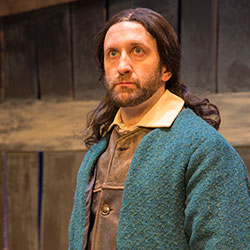
John Proctor, played by Ronan Horgan
John Proctor could be described as the tragic hero of this play. He is an honest, upright citizen of the town of Salem, who works hard, speaks his mind, but as with all such characters, is not without his flaws.
The events that drive relentlessly and ruthlessly to the tragic conclusion are triggered by the fact that, in the vernacular of the time, he has ‘known’ Abigail Williams. His ending of the affair with the young girl (which happens before the play begins) and Abigail’s jealousy and resentment of his wife, Elizabeth, sets her plotting the witch hysteria which spirals out of control.
In the town, John Proctor’s name is associated with honour and integrity. He is known to be a man who has no time for hypocrisy. He is respected and, perhaps more important than that, he respects himself, which is why he carries a heavy burden of guilt for his failings and why he cannot countenance yielding to those who urge him to lie to save his life – his good name is of greater value.
-1790-desat-640px.jpg)
[back row] Aoibhinn Ní Fhionnagáin (Abigail Williams) and Aishling Ní Fhoghlú (Betty Parris)
[front row] Máirín Condon (Mary Warren), Jessica Checkley (Susanna Walcott) and Aideen Ahern (Mercy Lewis)
This story takes place during 1692 and is set in a small village just twenty miles north of Boston. Given what transpires there the place is ironically named Salem, which is derived from the Hebrew word 'Shalom' and the Arabic word 'Salaam' meaning 'peace'. In that part of north east America, the Puritans created a new society of their own in the first half of the seventeenth century. They left England, disenchanted with the intolerance they experienced for the expression of their religion, and they organised their new community in the New World around their strict religious principles. The King of England gave them a charter to establish a settlement by a bay north of Boston, which became known as the Massachusetts Bay Colony.
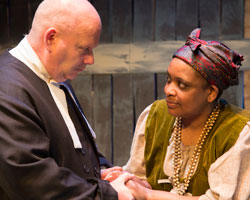
Brian Molloy (Rev. Hale) and Eleanor Phiri (Tituba)
The story that is now known as 'The Salem Witch Trials' began when three women, Sarah Good, Sarah Osborne, and Tituba, a slave from Barbados, were charged with witchcraft. The practice was prohibited by law in that community, but was already viewed less fearfully by the increasingly secular and scientific view of the world prevalent in the homeland the Puritans left behind in England.
In a tragic chain reaction fuelled by a curious mix of local animosities and greed, personal and political power-plays and paranoia together with superstitious and religious beliefs, over 200 people were accused of practicing the Devil's magic. Between June and October 1692, this 'pure' society embarked upon an orgy of paranoid suppression, which included imprisonment without trial, where at least five men and women died in the unsanitary conditions, while their families were required to pay rent for their incarceration; torture to extract confession, which killed one Giles Corey; and execution by hanging, which ended the lives of 19 other citizens in Salem, a small village with a total population of around 500 people. For many of those hanged, it was a torturous, slow death from strangulation as the crude methods often failed to break their neck.
Over two hundred years later, Arthur Miller was caught up in another period of paranoid suppression — different in practice, but with parallels in principle. He was suspected of being sympathetic to Communism because of petitions he signed and meetings he attended in the 1940s and 1950s. His passport application was denied by the United States Department of State in 1954. He was brought before the House Committee on Un-American Activities (HUAC) in 1956 and was convicted of contempt of Congress because he refused to 'name names'. That conviction was overturned in 1958.
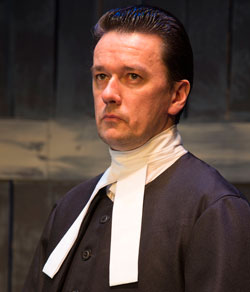
Seán Murphy (Rev. Parris)
So, when what happened in Salem in 1692 is remembered and analysed in the context of the 1950s 'witch hunt' in the United States against Arthur Miller and many others, his play, first performed in New York on 22 January 1953, takes on a whole new meaning. The persecution of witches in the seventeenth century may be different to the treatment of those who were feared and vilified for what Senator McCarthy's crusading committee termed 'un-American activities' in the twentieth century, but it has some interesting parallels with modern times.
In the context of what frightens societies today, and the denial and erosion of civil liberties judged necessary by many governments in defence of national security, law and order, the play provides a thoughtful reflection on how a society perceives threat, deals with its fears and balances the needs and greed of individuals and groups. It provides food for thought on how people, on their own and when assembled into communities, can rush to judgement. However, one of the most enduring aspects of the play, quite apart from the fact that it is powerful drama, is how it turns its critical spotlight on the real devils, both little and large, which may live inside a community, as much as any evil force which might invade from outside. It shows how individuals, institutions and society as a whole can exhibit a strong, sometimes dangerous desire to do whatever it takes to get a desired result, maintain the status quo and suppress challenging or disruptive dissent.
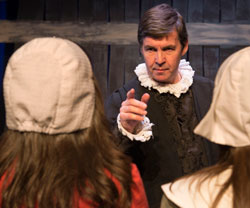
Declan Brennan (Deputy Governor Danforth)
An interesting review of the real story and some of the opinions and theories about it can be found in an hour-long documentary produced by the History Channel. A copy of that programme, 'Witch Hunt', is on YouTube.
For a much shorter and less reverent summary and analysis, check out this 'Thug Notes' video where "we's separatin' wheat from chaff" on this classic play in a way that's brief (4 minutes), but to the point.
Balally Players production of Arthur Miller's 'The Crucible', one of the masterpieces of American drama by one of the greatest playwrights, realised for the stage by Geoff O'Keeffe with a strong cast of players, proved to be as enjoyable as it was thought-provoking.
"He have his goodness now. God forbid I take it from him!"
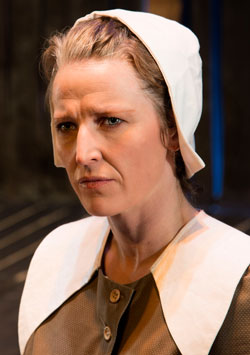
Elizabeth Proctor played by Claire O'Donovan
Elizabeth Proctor is a virtuous woman, but by her own admission, she can be emotionally reserved and withdrawn. “I never knew how I should say my love. It were a cold house I kept!” Having said that, her long illness following the birth of her last child and the discovery of her husband’s recent affair with their housekeeper, Abigail Williams, condition how she feels.
In a reaction to the affair, Elizabeth expels Abilgail from her house and then she lets it be known around town that the girl is less than wholesome, which prompts reciprocal vengeance from Abigail.
However, Elizabeth is perhaps the character who engenders the most sympathy. She becomes a blameless victim, who by lying to protect her husband ends up sealing his fate at the hands of the ruthless court.
At the emotional end of the play she urges her husband John to forgive himself before he is taken to his death.
Arthur Miller (1915-2005)
"What terrifies one generation is likely to bring only a puzzled smile to the next."
Arthur MillerAs writer and essayist, Arthur Asher Miller became famous for his words, the life he lived and indeed those with whom he sometimes lived, loved and fought. The works, for which he is rightly remembered and revered, include All My Sons (1947), Death of a Salesman (1949), The Crucible (1953) and A View from the Bridge, which began as a one-act play in 1955 and was revised a year later to two-acts. The film for which he is best known is the The Misfits (1961).
Towards the end of the 1940s, during the 1950s and early in the 1960s, he attracted attention for more than what he wrote. In that period he testified before the 'House Un-American Activities Committee', presided over by Senator McCarthy in the United States, he was married to Marilyn Monroe and he also received the Pulitzer Prize for Drama.
Miller is considered to be one of the greatest dramatists of the twentieth century.
His writings on the theatre are published in The Theatre Essays of Arthur Miller edited by Robert A Martin. In a short essay on 'The Nature of Tragedy' he notes something that marks an aspect of his writing and which adds depth and truth to John Proctor's struggle in The Crucible. "When I show you why a man does what he does, I may do so melodramatically; but when I show why he almost did not do it, I am making drama".
As he watched The Crucible taking shape as a movie, Arthur Miller, wrote: "What terrifies one generation is likely to bring only a puzzled smile to the next. I remember how in 1964, only twenty years after the war, Harold Clurman, the director of 'Incident at Vichy', showed the cast a film of a Hitler speech, hoping to give them a sense of the Nazi period in which my play took place. They watched as Hitler, facing a vast stadium full of adoring people, went up on his toes in ecstasy, hands clasped under his chin, a sublimely self-gratified grin on his face, his body swivelling rather cutely, and they giggled at his overacting".
Arthur Miller died at his home in Roxbury, Connecticut on 10 February 2005, the 56th anniversary of the Broadway debut of Death of a Salesman. He was 89 years old.
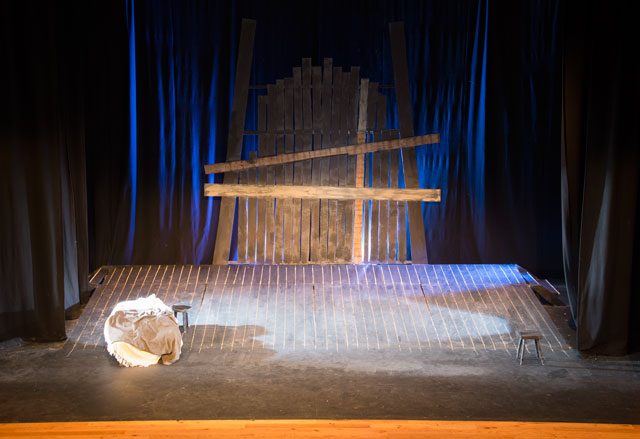
The view of 'The Crucible' set from the Mill Theatre Auditorium.
|
Rev. Parris Betty Parris Tituba Abigail Williams Susana Walcott Anne Putnam Thomas Putnam Mercy Lewis Mary Warren John Proctor Rebecca Nurse Giles Corey Rev. Hale Elizabeth Proctor Francis Nurse Ezekiel Cheever Marshall Herrick Judge Hathorne Deputy Governor Danforth Sarah Good |
Sean Murphy Aishling Ní Fhoghlú Eleanor Phiri Aoibhinn Ní Fhionnagáin Jessica Checkley Susan Nix Francis Cahill Aideen Ahern Máirín Condon Ronan Horgan Muriel Caslin-O'Hagan Steve Curran Brian Molloy Claire O'Donovan Pat O'Grady Oran O'Rua Cormac MacGabhann Michael Sharp Declan Brennan Doris Cullen |
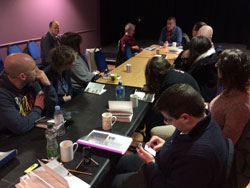
Members of the cast of 'The Crucible', with Director Geoff O'Keeffe and Production Manager Michael Kennedy, during a break at the first read-through for the play on Sunday 19 January in the Mill Theatre.
|
Director Set Design Lighting Design Costume Design Sound Design Producer Production Manager Stage Manager ASM Make-Up Set Construction Furniture Constrcution Wardrobe Assistant Properties Poster/Programme Design Production Photography Publicity Lighting Assistant Backstage |
Geoff O'Keeffe Gerard Burke Paul Macken Dympna Murray Kate Canning Karen Carleton Michael Kennedy Aoife Braiden Doris Cullen Teresa Dempsey Pat Hand Bryan Dempsey Orla Cooney Katerzyme Horzela, Doris Cullen Aoife O'Toole Declan Brennan Myra McPartlin Sheila O'Kelly Joanne Keane |
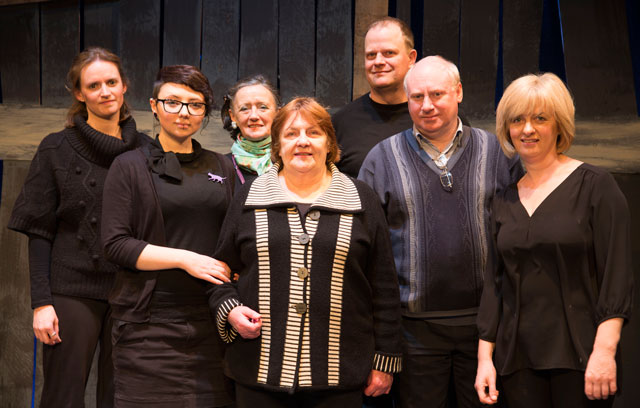
Some members of the Crew: [back row] Aoife Braiden (Stage Manager), Teresa Dempsey (Make-Up), Michael Kennedy (Production Manager).
[front row] Katerzyme Horzela (Props), Doris Cullen (Props), Paul Macken (Lighting) and Orla Cooney (Wardrobe Assistant).
On Sunday 24 March, as the set was being constructed and the cast was running lines and checking costumes, director, Geoff O'Keeffe, spoke about the play and what he hoped audiences would experience when they came to see it in the Mill Theatre.
'The Crucible' programme
 Programme cover
Programme coverThe 'The Crucible' programme is available here as a PDF document using one of the links below.
Low Resolution (for viewing on screen: size = 1.0MB)
Higher Resolution (for printing: size = 3.25MB)
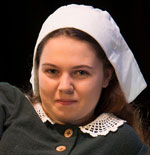
Jessica Checkley played 'Susanna Walcott'
This copy of the programme does not include an insert for cast member Jessica Checkley, who played 'Susanna Walcott'.
To open the document in a separate browser tab, left-click on the link above. To download a copy of the PDF file, right-click on the link and select "Save as....."
The programme was printed as a 6-page tri-fold A3 document in black and white. The PDF of the artwork shows each page separately.
Picture Gallery
Photographs from productions are stored on the SmugMug.com site. The Balally Players SmugMug account allows for the viewing and downloading of images at various sizes if high resolution pictures have been uploaded. The slideshow can be run and stopped by clicking on the play (>) and pause (¦¦) icons. You can move forward and back by clicking on the right or left of the image. To go to the gallery of these images stored in the Balally Players pages of the SmugMug site visit www.balally.smugmug.com to see all of the available galleries of images and download copies in a range of different sizes.
-1768-640px.jpg) This is one of the publicity shots taken for 'The Crucible'
This is one of the publicity shots taken for 'The Crucible' [standing] Aideen Ahern (Mercy Lewis) [seated] Aishling Ní Fhoghlú (Betty Parris) and Jessica Checkley (Susanna Walcott)
Production Photography by Declan Brennan

